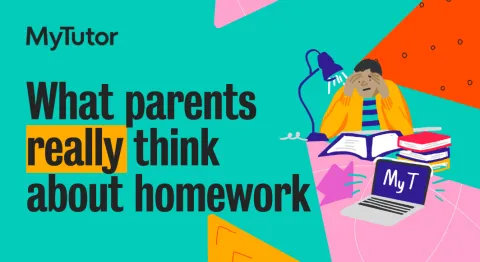Half of parents insist they wouldn’t pass school exams if they had to take them today, MyTutor study finds
A staggering 50 percent of the nation’s parents say they wouldn’t have the knowledge to pass today's exams, let alone any new Advanced British Standard that are set to replace A levels in the future, according to a new survey.
Londoners are the least confident about passing school exams (31 percent), along with parents in Cardiff (42 percent) and Stoke-on-Trent (42 percent).
In fact, almost nine in ten (87 percent) say that schoolwork has become much more challenging than the work they had to complete in school, with a further 77 percent believing their children work much harder than they did at the same age.
Four in ten (44 percent) parents in the survey, which was commissioned by leading online tuition business MyTutor, confess they have been left scratching their head when doing secondary homework, while a third (34 percent) have had problems with primary school homework.
On average, British parents spend an average of four hours helping their children do their homework a week.
Maths (57 percent), chemistry (30 percent), physics (29 percent), French (27 percent) and biology (18 percent) are the subjects that British parents struggle the most with.

Download our latest e-book here to see the whole story.
Florence Milner, UK Schools General Manager at MyTutor said: “Even though most parents devote a significant amount of time weekly to helping their children with schoolwork, it’s unsurprising that many find the task daunting. Few would claim to be expert in every subject, many will have left formal education years before and the vast majority, according to our survey, acknowledge that the curriculum is much more challenging now than when they were in school. Given that, it’s understandable that so many parents are actively seeking additional tuition to support their children.”
Looking back on their own school days, a third (33 percent) of parents admit that they hated school, with two thirds (60 percent) wishing they studied harder and had taken the exams more seriously (52 percent).
88 percent believe they would have benefited from having a tutor when they were at school.
A quarter (27 percent) have considered getting an out of school tutor to help their child with their work but for 60 percent the cost of hiring someone is just too expensive, so much so that they would prefer the school to help instead (25 percent).
One in five (19 percent) have contacted their child’s school to ask for additional help while 39 percent say they don’t get enough support from their child’s school.
A quarter (23 percent) admit they are unaware if the school even offers any extra support. A sixth (15 percent) don’t think the school has time to help with schoolwork.
“All the evidence shows that small-group tutoring can have a significant, positive impact on a child’s academic progress”, added Ms Milner. “Parents increasingly expect schools to facilitate this – not only because they may lack the resources to do it themselves but also because they appreciate that schools are best-placed to ensure that the tuition is targeted and aligns with the curriculum delivered by the school.
“The National Tutoring Programme (NTP) [the Department for Education's project to supports schools by providing funding to spend on academic support delivered by trained and experienced tutors and mentors] is tackling the attainment gap but a lack of funding is threatening its long-term future, and arrangements for next year are still to be confirmed.”
73 percent end up arguing over homework, with 42 percent confessing they get frustrated when their child ignores their advice. Four in ten (41 percent) get annoyed when their child’s mind wanders with a further 39 percent tearing their hair out when their child gets bored and starts doing something else.
A sixth (16 percent) say they quarrel with their children because they are cleverer than them, while one in ten (11 percent) get upset because their offspring aren't as clever as they want them to be.
When it comes to the trickiest tasks to complete, over half (52 percent) find trigonometry the hardest having completely forgotten how to do it from their school days, along with Pythagoras theorem (46 percent), algebra (46 percent), calculating Pi (39 percent) and the periodic table (35 percent).
One in three (34 percent) have no idea how to convert fractions, while 32 percent dread long division cropping up.
Asking where the hospital is in French (31 percent), comparative and superlative adjectives (31 percent), the difference between types of triangles (26 percent) and the difference between a noun, verb and an adjective (21 percent) also leave mums and dads scratching their heads.
TOP 15 THINGS THAT PARENTS HAVE COMPLETELY FORGOTTEN SINCE SCHOOL:
- Trigonometry - 52%
- Pythagoras' Theorem - 46%
- Algebra - 46%
- How to calculate Pi - 39%
- The periodic table - 35%
- How to convert fractions - 34%
- Long division - 32%
- How to ask where the hospital is in French - 31%
- Comparative and superlative adjectives - 31%
- The different types of triangles - 26%
- The difference between a noun, a verb and an adjective - 21%
- Beginning and end dates of World War I and World War II - 19%
- Correct use of grammar and punctuation - 15%
- Common flags of the world - 15%
- Capital cities of countries - 13%
Our research is making headlines! This story has been featured in local and national press including The Times, Daily Mirror, Daily Mail, and on BBC Breakfast!
To get the full story download our latest e-book 'Marks out of 10: What parents really think about their children's homework.' Download it for free here!



